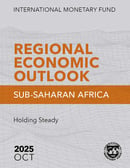This web page provides information on the activities of the IMF office in Equatorial Guinea, views of the IMF staff, and the relations between Equatorial Guinea and the IMF. Additional information can be found on the Equatorial Guinea and IMF country page, including official IMF reports and Executive Board documents.
At A Glance
- Equatorial Guinea joined the Fund in December 22, 1969
- Total Quotas (SDR): 157.5 million
- Outstanding Purchases and Loans (SDR): 76.54 million (as of September 30, 2023)
- Article IV/ Country Report: August 2022
Office Activities
Resident Representative Presentation in Malabo Youth Center (Presentation in Spanish)
The IMF Resident Representative Office in Equatorial Guinea gave a presentation to explain IMF’s mandate and role, as well as the activities implemented, and programs agreed with the Government since 2018. The event brought together more than 30 young people who showed interest in the work of the IMF. This event was organized with other UN agencies in the country to celebrate the United Nations Day.
October 26, 2023
The IMF Resident Representative Office in Equatorial Guinea presented to government’s officials on the role of the IMF in the country and its mandate. This presentation aimed at showing activities implemented by the IMF in Equatorial Guinea and the programs agreed with the Government since 2018, focusing on the 2019 EFF Program explaining its main specifications, main structural reforms, and fiscal adjustments; as well as the importance of the Resident Representative Office in the country. After the presentation, most of the questions focused on the EFF Program implementation status and outcomes. The seminar was organized by the Ministry of Foreign Affairs to disseminate the work and importance of multilateralism and international organizations to national; in addition, to explaining the work and mandate of each organization. All UN institutions were also invited.
June 13, 2023
REO Launch Presentation for Equatorial Guinea
Presentation in Spanish
November 11, 2019
GNQ and IMF
No results found. Either there was an error with the web service or there is no data returned by the web service.
Regional Economic Outlook
October 16, 2025

The outlook for Sub-Saharan Africa is showing resilience, despite a challenging external environment with uneven prospects in commodity prices, still tight borrowing conditions, and a deterioration of the global trade and aid landscape.
Read the Report
Departmental Papers on Africa
 The Departmental African Paper Series covers research on sub-Saharan Africa conducted by International Monetary Fund (IMF) staff, particularly on issues of broad regional or cross-country interest. The views expressed in these papers are those of the author(s) and do not necessarily represent the views of the IMF, its Executive Board, or IMF Management.
The Departmental African Paper Series covers research on sub-Saharan Africa conducted by International Monetary Fund (IMF) staff, particularly on issues of broad regional or cross-country interest. The views expressed in these papers are those of the author(s) and do not necessarily represent the views of the IMF, its Executive Board, or IMF Management.
Fraudulent Scam Emails
For more information please see Fraudulent Scam Emails Using the Name of the IMF



